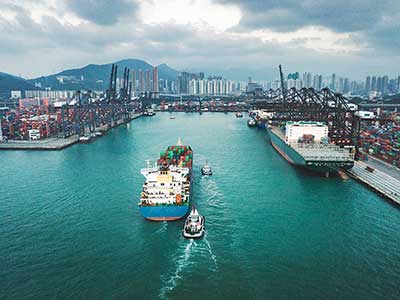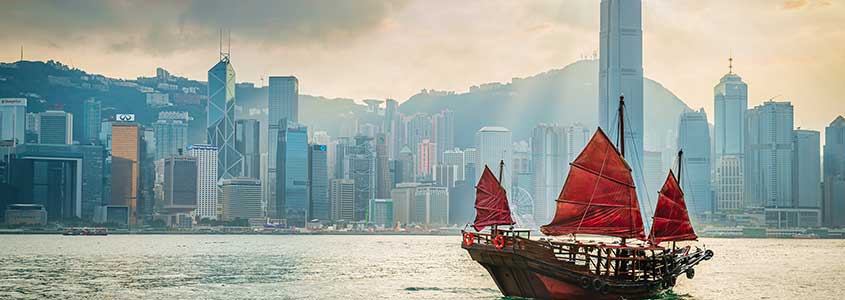Residence in Hong Kong
Hong Kong has been a Special Administrative Region (SAR) of the People’s Republic of China (PRC) since 1997. Hong Kong is situated on the southern border of China and is one of the most densely populated cities in the world. Hong Kong is also considered to be one of the most competitive jurisdictions in the world and has one of the most liberal market economies. Throughout Hong Kong’s rich history, it has always attracted affluent families.
Hong Kong’s history
Hong Kong was once a British colony when China’s Qing dynasty government was defeated in the First Opium War in 1842, when it ceded Hong Kong Island to Britain. Within 60 years, Kowloon, the New Territories and 235 Outlying Islands were also leased to Britain. In 1984, the PRC and Britain signed the Sino-British Joint Declaration on the future of Hong Kong, agreeing to hand over Hong Kong to the PRC on 1 July 1997.
Following British rule from 1842 to 1997, the PRC assumed sovereignty under the ‘one country, two systems’ principle. The Hong Kong Special Administrative Region’s constitutional document, the Basic Law, ensures that the current political situation will remain in effect for 50 years.
The rights and freedoms of people in Hong Kong are based on the impartial rule of law and an independent judiciary*.
*Source: Government of Hong Kong
Hong Kong’s government & economy

The Basic Law ensures that Hong Kong remains within the Common law system*. The judiciary is independent from the legislative and executive branches of government, with the courts showing no bias. The Court of Final Appeal is the highest appellate court and is headed by the Chief Justice. Hong Kong has its own monetary system: the Hong Kong dollar (HK$), and its own immigration policy and public security force. China is only responsible for Hong Kong’s foreign affairs and its military defence.
The Hong Kong Basic Law functions as the constitution of Hong Kong. The Chief Executive of Hong Kong is the head of the Hong Kong SAR. He or she is elected by a broadly representative Election Committee in accordance with the Basic Law, and is appointed by the Central People’s Government.
The Legislative Council is the law-making body of the Hong Kong SAR comprising members representing geographical constituencies and functional constituencies*.
Hong Kong’s economy
Hong Kong has over seven million residents. English and Chinese are the offical languages of Hong Kong, while most locals speak Cantonese, which is a Chinese dialect. Although Hong Kong is a metropolitan city, the absolute majority of residents are of Chinese origin.
❝ Hong Kong offers a territorial tax system ❞
Being an open economy, Hong Kong has many areas of strength – level playing field for businesses, competitive tax regime, free flow of capital and information, highly efficient markets, world-class infrastructure, and a fine tradition of rule of law, etc. all being the cornerstones of the economic success.
Hong Kong is one of the most liberal economies, ranking constantly high in the Index of Economic Freedom. It is also one of the worlds more prominent financial centres, has its own stock exchange, and is home to many corporate headquarters in the Asia-Pacific region.
Hong Kong is very much a service-based economy. Trading is one of the key services provided out of Hong Kong. Due to its location, it functions as one of the gateways to China and acts as a distribution channel for products manufactured in China. Both its deep-water port and international airport play an important role in this.
Hong Kong has a credit rating of AAA or AA, depending on the rating agency.
*Source: Government of Hong Kong & https://www.basiclaw.gov.hk
Taxes in Hong Kong
- Personal income tax: Families relocating to Hong Kong find that Hong Kong is using a territorial basis of assessment for establishing one’s income tax liability. This means that residents of Hong Kong have to pay personal income tax on income that accrues in Hong Kong, or is derived from Hong Kong sources. Income derived from a foreign source or accruing outside the jurisdiction remains tax exempt, even when remitted at a later stage.The personal income tax is levied either at a standard rate of 15% or at a progressive rate ranging from 2% to 17% (top rate as of HK$ 200,000). In addition to the territorial tax system, certain types of income are fully exempted from tax, such as capital gains.
- Wealth tax: The Hong Kong tax authorities do not levy a wealth tax on persons residing in the jurisdiction.
- Inheritance and gift tax: Hong Kong does not impose an inheritance or gift tax, or estate duty.
- Stamp duty and VAT: Hong Kong does not impose Value Added Tax. Stamp duty is payable on certain transactions, including the transfer of real estate and shares in companies listed or incorporated in Hong Kong.
- Exit tax: Hong Kong does not levy an exit tax, but when you intend to leave Hong Kong to relocate to another jurisdiction, you need to notify the Hong Kong tax authorities prior to leaving the jurisdiction.
Source: The International Bureau of Fiscal Documentation. Last updated: September 2019.
Special tax treatment for foreigners relocating to Hong Kong
For foreigners taking up residence in Hong Kong, there is no special tax regime available. Like other residents of Hong Kong, immigrants benefit from its territorial tax regime.
Benefits of living in Hong Kong

Public transport is well-organised, mainly through its MTR rapid transit system and numerous bus lines, and most of Hong Kong’s inhabitants, therefore, use public transport to get around the city. The Hong Kong ferry, and other independent ferry lines, also play an important role in the daily life of Hong Kong’s population.
Hong Kong has a subtropical climate, which is quite humid. Its summers are hot and humid, with average temperatures reaching well-above 30C° and regular tropical rain showers. Winters are mild. Autumn is considered the best season of the year.
The quality of the Hong Kong health system is good, contributing to the life expectancy of the population, which is currently the highest worldwide. There are both public and private hospitals, some of which are considered to be among the best in the world. Hong Kong’s educational system is internationally considered to be one of the very best. Education is provided in Chinese (Cantonese) with written Chinese and English. Hong Kong has nine universities.
Visa and residency permit
Before considering relocation to Hong Kong, you should first visit the jurisdiction to familiarize yourself with it. Visitors from most jurisdictions do not need to obtain a visa before travelling to Hong Kong. It is, nevertheless, recommended to verify whether a visa is necessary in your case, and how many days you are allowed to spend in Hong Kong without one. Visitors to Hong Kong need to be able to sustain themselves during their stay (without working) and to hold return (or onward) tickets.
Taking up residence in Hong Kong
There used to be several ways to relocate and take up residence in Hong Kong for affluent families: on the basis of the Hong Kong Capital Investment Entrant Scheme and on the basis of an Investment as Entrepreneur (Business Investment Visa). The Capital Investment Entrant Scheme has, however, been suspended with effect from 15 January 2015. This leaves an Investment as Entrepreneur as the best option for affluent families to realise their relocation to Hong Kong.
An investment as entrepreneur in Hong Kong, which would lead to obtaining a Hong Kong residency permit, is open to all who fulfil the criteria, except for Chinese residents of Mainland China and nationals from Afghanistan, Cambodia, Cuba, Laos, North Korea, Nepal and Vietnam.
The main conditions for becoming a resident of Hong Kong are
- No security objection against the applicant and no criminal record.
- Good educational background; normally a first degree, however a proven track record could turn out to be sufficient (documentary evidence).
- Applicant should make a substantial contribution to the economy of Hong Kong by establishing a business or joining a start-up business.
Although the application procedure for a business-related residency permit in Hong Kong is relatively straightforward, it is recommended that applicants consult a local lawyer to assist with it.
The third condition in more detail:
- Business plan. A comprehensive business plan covering a two-year period should be submitted. This should include forecasted profit and loss, cash flow, etc. It will be assessed whether the business supports Hong Kong’s economic development.
- Business turnover. Should the applicant already be involved in relevant business in his/her home jurisdiction or elsewhere, profit and loss statements as well as balance (sheets) should be submitted with respect to the previous year (relevant experience will be taken into account).
- Financial resources. Statements for personal and corporate bank accounts should be submitted by the applicant in order to demonstrate sufficient funds to run the new business.
- Investment sum. Documentary proof evidencing the actual amount of capital investment should be submitted.
- Number of jobs. The human capital side of the business should be set out. How many jobs, which positions.
- Introduction of new technology or skills (if applicable). Explanation as to how these new technologies or skills can benefit the long-term development of Hong Kong.
Application procedure
The applicant should fill in an application form (ID 999A).
- A sponsor should fill in an application form (ID 999B). The local sponsor can be an individual or a company.
- Recent photograph.
- Photocopy of a valid travel document.
- Proof of academic qualifications and work experience.
- Proof of financial means (personal and corporate).
- Photocopy of employment contract(s).
- Two-year business plan.
- Any additional proof with respect to the business under formation (and existing business in case the Hong Kong based business will be related to already existing business outside of Hong Kong).
- Photocopy of rental contracts/supporting documents with respect to the establishment of an office.
- Photocopy of HK Business registration certificate.
- Photocopy of documents filed with the Company Registry.
- Photocopy of the necessary licenses/certificates to operate the business.
- Payment of a fee
In every case, all documents must be duly completed and signed. In case of dependants part B of the application, form ID 999A must be completed and signed by every dependant.
Upon successful completion of the application procedure, a visa/entry permit label will be issued. This should be presented to the immigration officer upon arrival in Hong Kong. After your actual relocation to Hong Kong, you will initially be allowed to stay for 24 months, based on the condition of being employed. Extension of the residency permit is possible on the condition that you still meet the eligibility criteria. Once you have ordinarily resided in Hong Kong for seven continuous years, you may apply for the right of abode.
Source: Immigration Department of the government of Hong Kong. Last updated: September 2019.
Hong Kong citizenship
It is not possible to obtain Hong Kong citizenship. There is also no special citizenship program. Due to the fact that Hong Kong is a SAR of the People’s Republic of China, you can in fact only apply for Chinese citizenship. As China does not allow its nationals to hold dual citizenship, you would need to renounce your existing citizenship.
As a result, most persons who relocate to Hong Kong settle for applying for permanent residency in Hong Kong (right of abode).
Leaving your home country and taking up residence in Hong Kong
Once you have established your business in Hong Kong, you have been granted the residency permit and you have actually moved to Hong Kong, you will be considered a tax resident of Hong Kong if you ordinarily reside or spend at least 180 days a year in the jurisdiction.
❝ Increasing numbers of entrepreneurial families are relocating to Hong Kong ❞
Although the jurisdiction is internationally not considered a tax haven, affluent families who consider relocating to Hong Kong should still make sure that they pay enough attention to how they intend to exit their current home jurisdiction. Making sure that you are really leaving your (former) home country is an essential element in any relocation strategy. This is even more important in the case of relocation to Hong Kong, due to the fact that Hong Kong has a territorial tax regime.



 The applicant should fill in an application form (ID 999A).
The applicant should fill in an application form (ID 999A).
